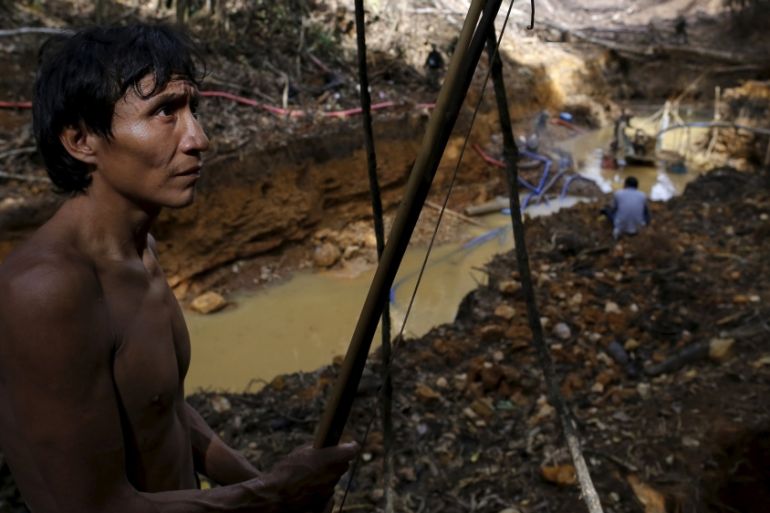Amazon: The final frontier?
There are still a few indigenous groups existing in voluntary isolation in the Amazon – for who knows how much longer.

Last year, American anthropologists Robert Walker and Kim Hill – of the University of Missouri and Arizona State University respectively – took it upon themselves to write an editorial for the weekly journal Science, entitled “Protecting isolated tribes”.
The tribes in question, according to Walker and Hill, are “about 50 isolated indigenous societies across lowland South America … with limited to no contact with the outside world”.
Keep reading
list of 4 itemsAustralian war crimes whistleblower David McBride jailed for six years
Will Israel’s war on Gaza sway South Africa’s election?
Masked Tunisian police arrest prominent lawyer for media comments
According to the prominent human rights group Survival International, there are more than 100 so-called “uncontacted” tribes living in voluntary isolation in the world, the vast majority of them in the South American Amazon.
Walker and Hill’s strategy for “protecting” these groups is one of “controlled contact”, in which governments initiate well-organised and sustained contact with the tribes and gradually integrate them into the official domestic fold, where their rights can allegedly be better protected.
As the anthropologists’ reasoning goes, isolated existence is unviable in the long term given designs on the tribes’ territory by groups such as “miners, loggers, and hunters”, and governments should therefore pre-empt the damage.
‘Another genocide’
But the pro-contact campaign raises some significant issues. For one thing, the anthropologist’s job is to study human beings and their societies as they actually are, not to actively contribute to the drastic manipulation of the environment and conditions in which these societies exist.
Representatives of tribes that have already been contacted in South America have taken the critique a step further, denouncing forcible contact as tantamount to genocide.
In a recent video clip, Brazilian indigenous leader Olimpio Santos Iwyramu Guajajara reiterated a commitment to defending indigenous territory in the Amazon and elsewhere against the recommendations of “anthropologists from some countries who want, once again, to violate the rights of the uncontacted Indians in the country”.
Such violations, he emphasised, would constitute yet “another genocide”.
It's difficult to refrain from drawing parallels with other varieties of 'mission civilisatrice' that have long served as masks for profit-driven plunder throughout the globe, from Africa to the Americas and beyond.
Given the historical record, the G-word would hardly seem to be an exaggeration. As Survival International’s Fiona Watson told the British daily Independent in May: “In some of the contacts in the past, up to 90 percent [of indigenous people] have died within the first year … Even when it is around 50 percent, that is a huge amount of people to lose.”
Now consider Walker and Hill’s claim that “we know that soon after peaceful contact with the outside world, surviving indigenous populations rebound quickly from population crashes” – which is a rather polite and ambiguous way of acknowledging the near-certainty of mass indigenous death.
Imagine the reaction if scientists were to advocate administering some noxious treatment to, say, white Americans – with the assurance that, hey, the ones that managed to survive were sure to rebound quickly!
Civilising missions
Obviously, we mustn’t jump to conclusions regarding the individual motivations of anthropologists pushing for controlled contact.
But it is difficult to refrain from drawing parallels with other varieties of “mission civilisatrice” that have long served as masks for profit-driven plunder throughout the globe, from Africa to the Americas and beyond.
OPINION: Amazon roads – The beauty or the beast?
These missions are, of course, for ever cast as being for the benefit of the hapless folks on the receiving end of them.
As Walker and Hill tell it, forced contact is not only “humane and ethical”, the alternative is practically a crime: “Leaving groups isolated, yet still exposed to dangerous and uncontrolled interactions with the outside world, is a violation of governmental responsibility.”
![An indigenous Huaorani woman in the Ecuadorian Amazon [Amelia Opalinska /Al Jazeera]](/wp-content/uploads/2016/06/38ce17dc0c874162a3e950aba7724fd9_18.jpeg)
And while the authors themselves may indeed have the most charitable of intentions, the fact remains that this is exactly the sort of academic-official justification that is music to the ears of oil companies and like-minded entities eager to fully exploit the Amazon’s vast resources.
In 2009, I was able to observe some of the ramifications of “contact” while hitchhiking with a friend in Ecuador’s Amazon region.
There, a tribe called the Huaorani was forced into contact in the 1950s by evangelical Christian missionaries, who did things like drop cooking pots and other gifts from helicopters and graciously assisted in coaxing tribe members into protectorates where they wouldn’t interfere with oil operations.
Toxic panorama
When my friend and I visited, oil facilities saturated much of the landscape, and various international oil companies continued to buy the compliance of the area’s Huaorani residents with everything from food to DVD players.
A significant degree of indigenous dissatisfaction persists, however, owing to the forcible alteration of the tribe’s previous way of life and its replacement with one characterised by environmental contamination and disease.

There are still a few indigenous groups existing in voluntary isolation in Ecuador’s Amazon – for who knows how much longer.
Various Ecuadorians we spoke to in 2009 had internalised the civilising discourse to a certain extent, referring to the Huaorani as “civilised” and their uncontacted counterparts as “uncivilised” – although not necessarily in a pejorative sense.
Meanwhile, a cursory contemplation of the present panorama of toxic capitalism leaves one with the sneaking suspicion that voluntary isolation is in fact the more civilised option.
Belen Fernandez is the author of The Imperial Messenger: Thomas Friedman at Work, published by Verso. She is a contributing editor at Jacobin magazine.
The views expressed in this article are the author’s own and do not necessarily reflect Al Jazeera’s editorial policy.
